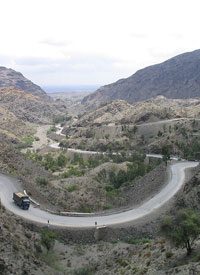
"About 60 masked gunmen popped up on the road and took away the trucks with their drivers. Not a single shot was fired anywhere," Bakhtiar Mohmand, a senior government administrator in the Khyber region of Pakistan, told Reuters news service.
Mohmand attributed the hijackings to militants loyal to Pashtun Taliban commander Baitullah Mehsud, saying: "Baitullah’s men are behind this as they’re very well-equipped and trained."
Eshtiar Mohmand (who was not identified as a relative of the government official by the same last name), the owner of a trucking company in Landikotal — a Pakistani city located at the highest point on the Khyber pass — complained about the lack of government security: "The government is a silent spectator. They attack our trucks, loot them and kill our drivers in broad daylight, even near security check posts, but they can’t do anything."
An article distributed by Asian News International (ANI) news service on October 30 observed:
The Pak-Afghan Highway has proved to be unsafe for local dwellers, passengers and transporters from Takhta Bag check-post to Torkham border, in the wake of bomb blasts, suicide attacks, firing and kidnappings.
Attacks have mainly taken place on trucks carrying supplies for the US and Afghan troops deployed in Afghanistan to combat Taliban and Al Qaeda.
As one of the few passes across the high mountain ranges separating the Middle East from the Indian subcontinent, the Khyber Pass has proved to be a strategic military supply route over the centuries. Among the invaders that who crossed the pass enroute to conquest have been Alexander the Great and Muslim invaders bound for South Asia. British forces based in India crossed the pass to invade Afghanistan and fought three Afghan Wars during the periods 1839-42, 1878-80, and 1919. George Molesworth, a member of the British force of 1919, once observed: "Every stone in the Khyber has been soaked in blood."
One of Napoleon’s five principles of warfare was: "Every effort must be made to render the enemy helpless through the severance of his lines of supply, communications, and retreat." (Emphasis added.) U.S. military commanders must be acquainted with these principles of warfare — but so, apparently, are the Taliban and al-Qaeda connected militants.
— Photo by James Mollison


